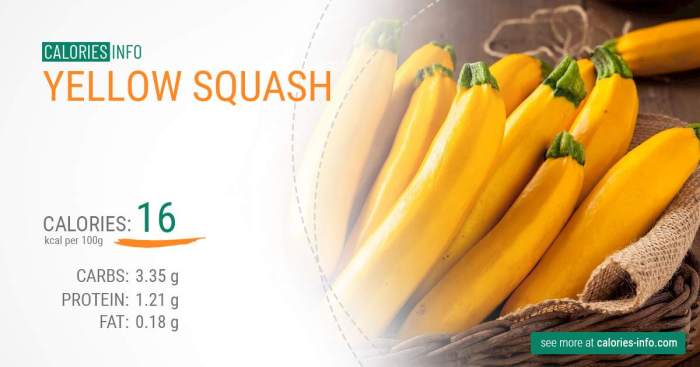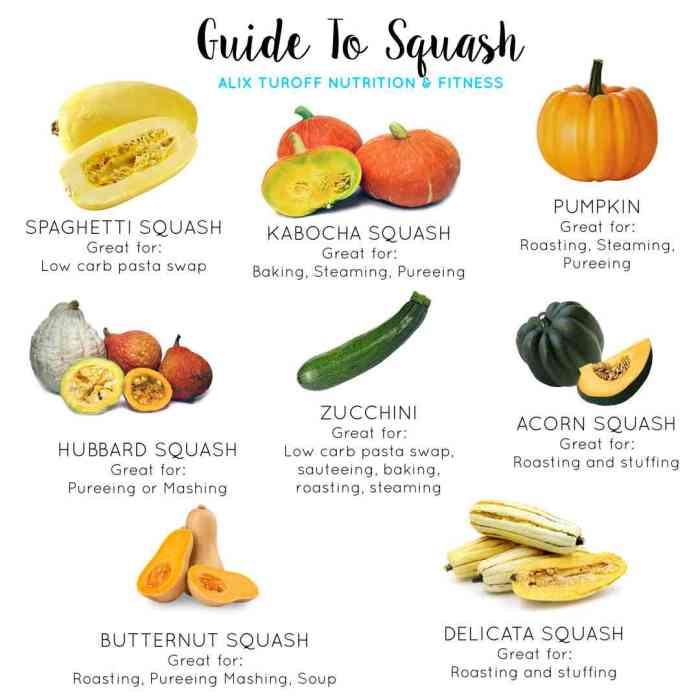Nutritional Composition of 100g of Squash: Squash Nutrition Facts 100g

Squash nutrition facts 100g – Aduh, so you want the lowdown on squash, eh? Let’s get into the nitty-gritty of what makes this humble veggie so
- mantap*. We’re talking about the nutritional powerhouse packed into just 100 grams – enough to make your
- mak* proud!
Macronutrient Breakdown
Okay, so we’re diving into the big three: carbs, protein, and fats. Squash isn’t exactly a protein bomb, but it’s got a decent amount of carbs, mostly in the form of healthy sugars. The fiber content is also
Want to know more about squash nutrition facts 100g? Understanding the nutritional content of squash is a great starting point for healthy eating. For comparison, you might also be interested in checking out the nutritional information for other hearty soups, such as the panera cheddar broccoli soup nutrition facts , to see how different vegetable-based dishes stack up.
Returning to squash, remember to consider serving size when comparing nutritional values.
- cukup penting*, keeping things moving smoothly, you know? The fat content is generally low, making it a great choice for those watching their waistline. Think of it as a sneaky way to get your daily dose of goodness without the guilt. The exact numbers can vary a bit depending on the type of squash, but we’re aiming for a general overview here,
- ya*.
Micronutrient Profile
Now, this is where things get interesting. Squash is jam-packed with vitamins and minerals – it’s like a tiny vitamin shop in veggie form! We’re talking Vitamin A (good for your eyes,
- tau*), Vitamin C (boosts your immunity), and Vitamin K (important for blood clotting). Plus, it’s got a decent amount of potassium and magnesium, which are crucial for keeping your heart happy and your muscles working properly. It’s a real
- jagoan* in the micronutrient department.
Glycemic Index and Load
The GI and GL are important factors to consider, especially if you’re watching your blood sugar levels. Squash generally has a low to medium GI, meaning it doesn’t cause a rapid spike in blood sugar. This makes it a suitable choice for people with diabetes or those trying to manage their blood sugar. Compared to other vegetables like potatoes (which have a higher GI), squash is a much gentler option.
It’s all about those slow-releasing carbs, – deh*.
| Nutrient | Amount per 100g (approx.) | Unit | Notes |
|---|---|---|---|
| Carbohydrates | 8-12 | g | Varies depending on squash type |
| Protein | 1-2 | g | Relatively low protein content |
| Fat | 0.1-0.5 | g | Very low fat content |
| Fiber | 2-3 | g | Good source of dietary fiber |
| Vitamin A | Variable | µg | High in some varieties |
| Vitamin C | Variable | mg | Good source of Vitamin C |
| Vitamin K | Variable | µg | Contributes to blood clotting |
| Potassium | Variable | mg | Important for heart health |
| Magnesium | Variable | mg | Supports muscle function |
| Glycemic Index (GI) | Low-Medium | – | Generally slow-releasing carbohydrates |
Squash Varieties and Nutritional Differences

Eh, so you’re keen to know more about the nutritionalbeda* between different types of squash, ya? It’s not just about the taste,
-
tau*. Different squashes pack different punches when it comes to vitamins and minerals. Think of it like this
some are the
- jagoan* of vitamin A, while others are the kings of potassium. Let’s dive in!
Nutritional Comparison of Butternut, Acorn, and Spaghetti Squash
Okay, so we’re comparing three popular squash types here: butternut, acorn, and spaghetti. These guys are all pretty nutritious, but their profiles differ slightly. The differences are subtle but can be significant depending on your dietary needs.
- Butternut Squash: This one’s often hailed as a superfood,
-eh*. It’s packed with beta-carotene (which your body converts to Vitamin A), providing a hefty dose of antioxidants. It’s also a decent source of potassium and vitamin C. Imagine a creamy, sweet squash that’s practically glowing with goodness. - Acorn Squash: This type has a slightly denser texture and a richer, nuttier flavour. Nutritionally, it’s similar to butternut, boasting a good amount of Vitamin A, but maybe a bit less than butternut. It also contains fiber, which is
-penting* for digestion. Picture a small, dark green squash, almost like a miniature pumpkin. - Spaghetti Squash: The name says it all,
-kan*? Its flesh separates into strands resembling spaghetti when cooked. It’s lower in calories and carbohydrates compared to butternut and acorn, making it a popular choice for those watching their weight. It’s still a good source of Vitamin C and fiber, though not as high as the other two. Think of a pale yellow, oblong squash that’s surprisingly versatile in the kitchen.
Reasons for Nutritional Variations
The differences in nutritional content stem from various factors,
tau*. It’s not just about the type of squash, but also things like growing conditions, soil composition, and even the ripeness of the squash at harvest. Genetic variations between the varieties also play a role. Think of it like this
even within the same family, each individual has unique characteristics.
Health Benefits of Squash Consumption
Eits, udah tau kan squash itu enak banget? But it’s not just a yummy snack, ah! This humble veggie is packed with goodness that’s seriously good for your health. Think of it as a superhero in disguise, a totaljagoan* in the nutrition game. Let’s dive into the awesome benefits, ya!
Squash, in all its glorious varieties, boasts a wealth of vitamins, minerals, and antioxidants. These nutrients work together like a well-oiled machine, contributing to overall well-being and protecting your body from various health issues. It’s like a natural power-up for your system, man!
Digestive Health Improvements from Squash
Squash is a fantastic source of fiber, a crucial element for a happy and healthy digestive system. The fiber in squash adds bulk to your stool, preventing constipation and promoting regular bowel movements. It’s like giving your gut a gentle, but effective, nudge. This fiber also feeds the good bacteria in your gut, contributing to a balanced microbiome—the ultimateasoy* for your tummy.
Think less bloating, less discomfort, and more regular trips to the loo (in a good way, of course!).
Immune System Support Through Squash Consumption
Loaded with Vitamin C and other antioxidants, squash acts like a bodyguard for your immune system. Vitamin C is a well-known immune booster, helping your body fight off infections and illnesses. The antioxidants in squash also combat free radicals, those pesky molecules that can damage your cells and weaken your defenses. So, eating squash regularly is like giving your immune system a serious upgrade, making you less prone to those pesky colds and flus.
It’s your personal, natural shield against sickness!
Eye Health Benefits of Squash, Squash nutrition facts 100g
Squash contains beta-carotene, a precursor to Vitamin A, which is essential for maintaining good eye health. Vitamin A is crucial for preventing night blindness and age-related macular degeneration, a leading cause of vision loss. Think of it as giving your peepers a daily dose of superhero protection. Plus, the other antioxidants in squash also help protect your eyes from oxidative stress, further contributing to their long-term health.
It’s like a spa day for your eyes, but way tastier!
Key Health Benefits of Squash Consumption
Let’s summarize the
-kekinian* health benefits of squash, supported by scientific evidence. It’s a short and sweet list of reasons to add this veggie to your daily diet, ya!
- Improved digestive health due to high fiber content.
- Enhanced immune function thanks to Vitamin C and antioxidants.
- Better eye health due to beta-carotene and Vitamin A.
- Potential reduction in chronic disease risk due to its antioxidant properties.
- Contribution to overall well-being through a balanced nutrient profile.
Question & Answer Hub
What is the best way to store squash to maintain its nutritional value?
Store whole, uncooked squash in a cool, dry, and dark place. Cut squash should be refrigerated and used within a few days.
Can I freeze squash?
Yes, you can freeze cooked or raw squash. Blanch before freezing for best results.
Are there any potential downsides or allergies associated with eating squash?
Squash allergies are rare, but some individuals might experience mild digestive discomfort if they consume large quantities. Always listen to your body.
How does the cooking method affect the nutritional content of squash?
While some nutrients might be lost during cooking, especially water-soluble vitamins, most of the essential nutrients remain intact. Steaming or roasting are generally preferred methods to minimize nutrient loss.
